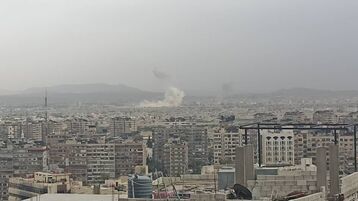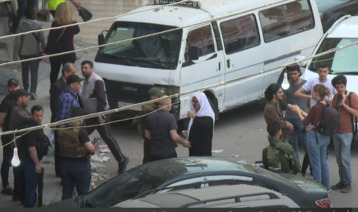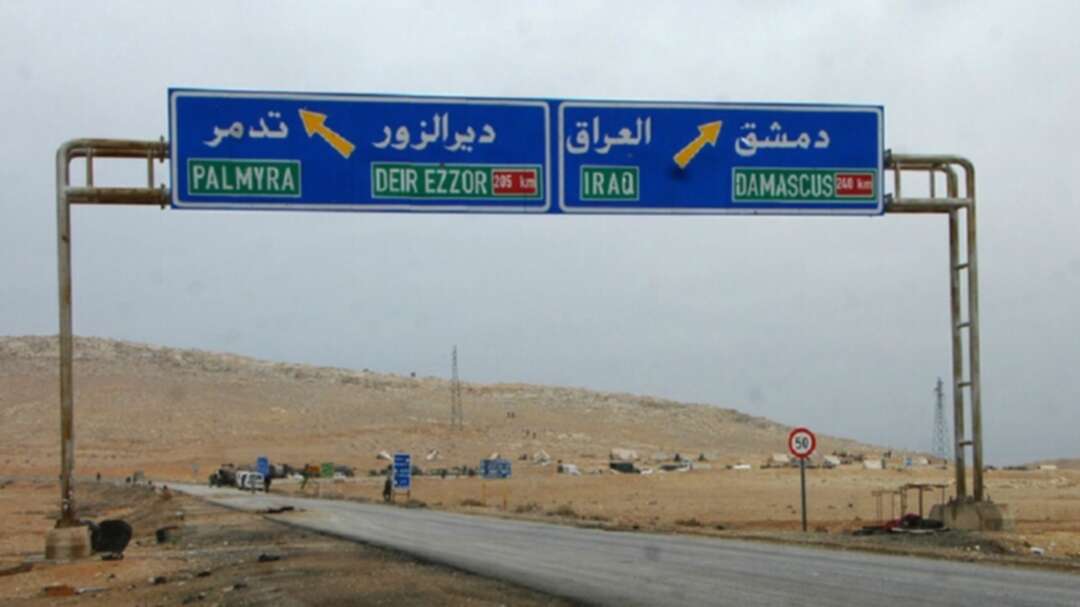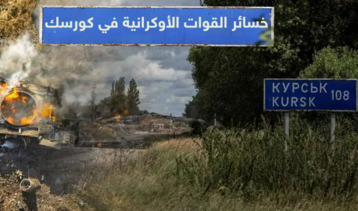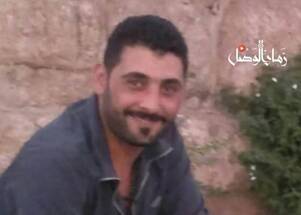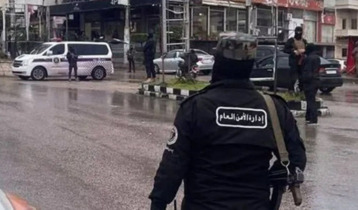-
Syrian Refugees in Border Camp Face Humanitarian Crisis
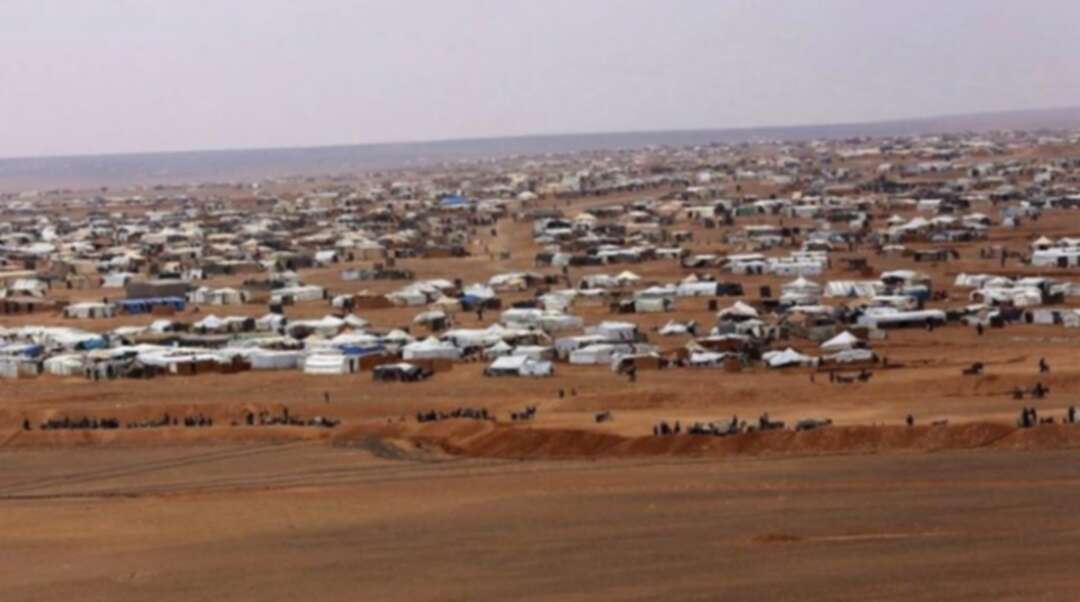
As conditions deteriorate inside the Rukban Syrian refugee camp, close to the border with Jordan, thousands of people appear to be fleeing to government-controlled areas to avoid brutal desert heat and starvation.
Food supplies are critically low, and drinking water is scarce. The last United Nations food aid was reportedly delivered in February.
Syrian government TV showed a convoy of green government buses and dozens of agricultural vehicles heading toward the Jlaighem checkpoint in the city of Homs. Russian media claim over 17,000 Syrians have fled the camp for government-held territory. VOA could not independently confirm the report.
Rukban is sandwiched between Jordan, which has refused to allow the refugees to enter the country, and Syrian government-held territory that many have fled for political reasons. Jordan doesn't want refugees due to overcrowding at the camps it runs and fear that a percentage of the camp's residents are affiliated with terrorist groups. Jordan closed its border to Syrian refugees in 2014.
Syrian government media claim that the U.S., which runs the nearby al-Tanf camp alongside the Syrian border — close to both Iraq and Jordan — has been "holding residents of the camp hostage." U.S.-trained Syrian militia fighters control parts of the border, ostensibly to prevent pro-Iranian forces from gaining a foothold in the area.
No-fly zone
Hilal Khashan, who teaches political science at the American University of Beirut, told VOA that "the situation of refugees in Rukban is much like that of those in Lebanon." He said "many sympathize with rebel groups, and some of the men are likely to face a gruesome ordeal if they return to the government side."
Joshua Landis, who heads the Department of International and Area Studies at the University of Oklahoma, told VOA that the "Rukban camp has been a problem for years, with 50,000 people stuck in the middle of the desert."
He said the Syrian government "originally refused to provide food and other supplies to the refugees there because it fell within an American no-fly zone and housed families of rebel fighters who were being trained and paid for by the U.S. to fight the Syrian government."
Landis went on to say that the Syrian government's attitude toward Rukban was, "If you're going to pay terrorists to kill us, you can feed their families." He added that the U.S., for its part, "wanted no part of feeding the refugees ... because Washington understood it would be on the hook forever for food, medical care and schooling."
"Rukban," he added, "symbolizes everything that can go wrong with no-fly zones."
'Going to bed hungry'
The Syrian government news agency SANA reported that many of those returning to government-held territory were "women, children and old people." Young men who have decided to return to government-controlled areas from other regions face conscription and are periodically arrested.
A middle-aged man wearing a turban claimed the situation inside the camp was "so bad that it is impossible to describe." He said that the "bakery has only enough flour left to operate two hours a day and that food and bread supplies are rapidly being exhausted."
A young woman with a child also claimed that "people are drinking dirty water."
Another man with leathery skin claimed in an interview with Syrian TV that his children were "going to bed hungry two or three days a week."
The Washington Post reported Wednesday that the U.S.-run camp at al-Tanf is refusing to send food aid to hungry residents inside the camp and that some residents were pleading on social media for the U.S. to help.
'Demilitarized zone'
The Rukban camp, which is 55 kilometers from al-Tanf, was designated a "demilitarized zone" in a joint U.S.-Russian agreement last year. Russian media quoted Col. Gen. Mikhail Mizintsev, who heads Moscow's National Defense Control Center, as saying that "the Syrian government is ensuring safe and dignified resettlement of civilians."
Mizintsev also claims that "2 million Syrians have returned home," and that many of them have come from Jordan and Lebanon. Turkey began forcibly repatriating Syrian refugees in recent days, as well.
Some media reports claim that close to 11 million Syrians were forced to leave their homes for other parts of the country and abroad since the outset of the country's more than eight-year-old civil war. Syria had a pre-war population of around 23 million people.
Interviews with residents of the Rukban camp in both Arab and Syrian government media indicate that they come from a wide swath of the country, including Raqqa, Deir el-Zour, Palmyra and Homs.
Tags
You May Also Like
Popular Posts
Caricature
BENEFIT Sponsors BuildHer...
- April 23, 2025
BENEFIT, the Kingdom’s innovator and leading company in Fintech and electronic financial transactions service, has sponsored the BuildHer CityHack 2025 Hackathon, a two-day event spearheaded by the College of Engineering and Technology at the Royal University for Women (RUW).
Aimed at secondary school students, the event brought together a distinguished group of academic professionals and technology experts to mentor and inspire young participants.
More than 100 high school students from across the Kingdom of Bahrain took part in the hackathon, which featured an intensive programme of training workshops and hands-on sessions. These activities were tailored to enhance participants’ critical thinking, collaborative problem-solving, and team-building capabilities, while also encouraging the development of practical and sustainable solutions to contemporary challenges using modern technological tools.
BENEFIT’s Chief Executive Mr. Abdulwahed AlJanahi, commented: “Our support for this educational hackathon reflects our long-term strategic vision to nurture the talents of emerging national youth and empower the next generation of accomplished female leaders in technology. By fostering creativity and innovation, we aim to contribute meaningfully to Bahrain’s comprehensive development goals and align with the aspirations outlined in the Kingdom’s Vision 2030—an ambition in which BENEFIT plays a central role.”
Professor Riyadh Yousif Hamzah, President of the Royal University for Women, commented: “This initiative reflects our commitment to advancing women in STEM fields. We're cultivating a generation of creative, solution-driven female leaders who will drive national development. Our partnership with BENEFIT exemplifies the powerful synergy between academia and private sector in supporting educational innovation.”
Hanan Abdulla Hasan, Senior Manager, PR & Communication at BENEFIT, said: “We are honoured to collaborate with RUW in supporting this remarkable technology-focused event. It highlights our commitment to social responsibility, and our ongoing efforts to enhance the digital and innovation capabilities of young Bahraini women and foster their ability to harness technological tools in the service of a smarter, more sustainable future.”
For his part, Dr. Humam ElAgha, Acting Dean of the College of Engineering and Technology at the University, said: “BuildHer CityHack 2025 embodies our hands-on approach to education. By tackling real-world problems through creative thinking and sustainable solutions, we're preparing women to thrive in the knowledge economy – a cornerstone of the University's vision.”
opinion
Report
ads
Newsletter
Subscribe to our mailing list to get the new updates!

